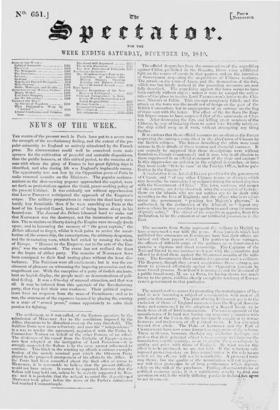NEWS OF THE WEEK.
THE events of the present week in Paris have put to a severe test the strength of the revolutionary feeling, and the extent of the po- pular anhnosity to England so actively stimulated by the French press. No circumstance could well be conceived more mal- apropos for the cultivation of peaceful and amicable dispositions, than the public honours, at this critical period, to the remains of a man with whom the glory of France in her great fighting days is identified, and who during life was England's implacable enemy. The opportunity was not lost by the Opposition press of' Paris to make renewed assaults on the Ministers. The popular acelama- mations as the slow-moving pageant approached the capital, were set forth as protestations against the timid, peace-seeking policy of the present Cabinet. It was evidently not without apprehension that Louts PHILIPPE anticipated the approach of the Emperor's corpse. The military preparations to receive the dead body were hardly less formidable than if he were marching on Paris at the head of his Imperial Guard, instead of being borne along in his funeral-car. The Journal des Dads laboured hard to make out that NAPOLEON was the destroyer, not the incarnation of revolu- tion. The restraints on liberty during the Empire were strongly dwelt upon; and ill honouring the memory of " the great captain," the .1.Vbats affected to forget, whilst it took pains to revive the recol- lection of, the censorship, the conscriptions, the arbitrary despotism, and the devastating wars, which had ended by rousing the whole of Europe. " Honour to the Emperor, not to the acts of the Em- pire," was the sentiment. The event has not realized the fears or the hopes of either party. The remains of NAPOLEON have been consigned to their final resting-place without the least dis- turbance. The Parisians were all excitement ; but it was the ex- citement of pleasure on witnessing the imposing procession and the magnificent ear. With the exception of' a party of foolish students, bent on boyish display, the people made no demonstrations of poli- tical feeling. It was a Pte-day of unusual attraction, and that was all. It may be inferred from this quietude of the Revolutionary party, that they feel their own weakness. Their political aspira- tions have no response from the mass of Frenchmen ; and as to war, the statement of the expenses incurred by placing the country in a state of' " armed peace," comes opportunely to calm their passion tbr fighting.


























